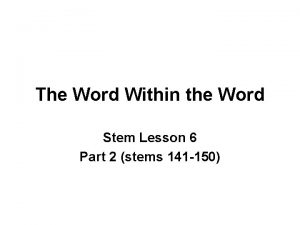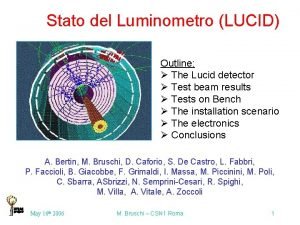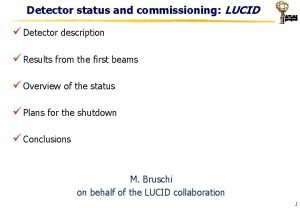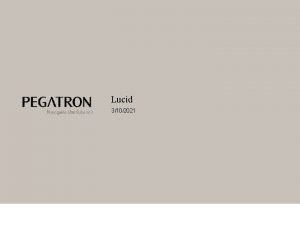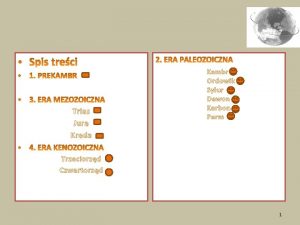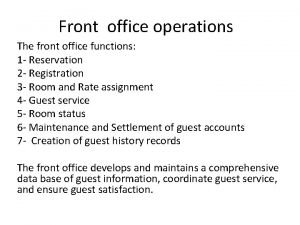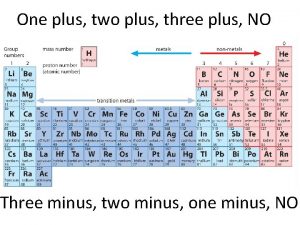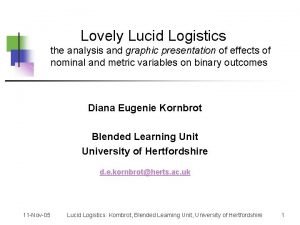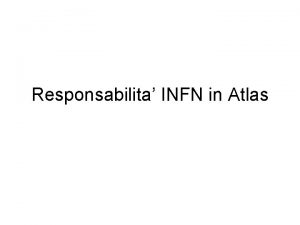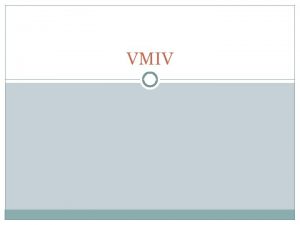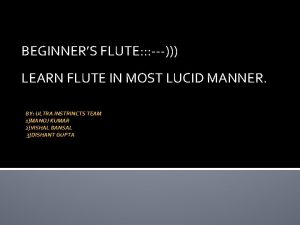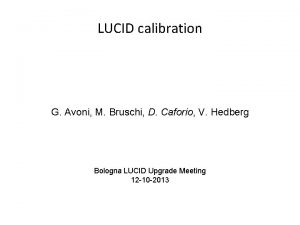Department I C Plus Modern and Lucid C





![Important 6 values[0] : <empty> n The array containing the data is just plain Important 6 values[0] : <empty> n The array containing the data is just plain](https://slidetodoc.com/presentation_image/35f4bd9dc5c28babb8b582163ef8cfef/image-6.jpg)




![Pushing Elements into the Buffer n Pushing the value 1 to index 0 values_memory[0] Pushing Elements into the Buffer n Pushing the value 1 to index 0 values_memory[0]](https://slidetodoc.com/presentation_image/35f4bd9dc5c28babb8b582163ef8cfef/image-11.jpg)


















- Slides: 29

Department I - C Plus Modern and Lucid C++ Advanced for Professional Programmers Part 8 b – Testat 2 Background Thomas Corbat / Prof. Peter Sommerlad Rapperswil, 23. 02. 2017 HS 2017

Topics n Handling Non-Default-Constructible Types in Your Bounded Buffer n Implementing Special Member Functions n Iterator for Bounded. Buffer 2

Non-Default-Constructible Types

Non-Default-Constructible Types n A type is non-default-constructible when. . . there is no explicit default constructor and. . . n. . . there is no implicit default constructor! n Why can't we use new T[capacity] for allocating a T array? n If T is of class type it must be default-constructible to allow this call. n That is not the case for fundamental types! n Alternative n Allocate a char array and manage the objects "manually" 4

Char Array as Memory for Elements (Allocation) n How to declare the member variable? n As plain char pointer char * values_memory; n As std: : unique_ptr<char[]> values_memory; n Allocating a char array of correct size Buffer(size_t capacity) : values_memory{new char[sizeof(T) * capacity]}{} n sizeof returns the size in byte (or char since sizeof(char) is always 1) n Invalid (In T[capacity] must not have dynamic capacity – C 99 Extension) Buffer(size_t capacity) : values_memory{new char[sizeof(T[capacity])]}{} 5
![Important 6 values0 empty n The array containing the data is just plain Important 6 values[0] : <empty> n The array containing the data is just plain](https://slidetodoc.com/presentation_image/35f4bd9dc5c28babb8b582163ef8cfef/image-6.jpg)
Important 6 values[0] : <empty> n The array containing the data is just plain memory (zeros and ones) n Lifetime values_memory size: 3 start_index: 1 push n Access to this memory has to be handled with care! Buffer values_memory size: 4 start_index: 1 n Destruct element n Construction and destruction is independent of memory allocation and deallocation! values[3] : T values[4] : <empty> values[1] : T values[2] : T values[3] : T values[4] : T pop n Access element values[2] : T values[0] : <empty> Buffer n Construct element in place values[1] : T values[0] : <empty> Buffer values_memory size: 3 start_index: 2 values[1] : <empty> values[2] : T values[3] : T values[4] : T

Char Array as Memory for Elements (Deallocation) How can we deallocate such a char array. . . n. . . when using the plain pointer? char * values_memory; n Destructor ~Buffer() { delete[] values_memory; } n Assignment operators B & operator=(B const & o) { delete[] values_memory; values_memory = new char[. . . ]. . . return *this; } n. . . when using the unique_ptr? std: : unique_ptr<char[]> values_memory; n Destructor ~Buffer() { //unique_ptr gets deallocated implicitly } n Assignment operators B & operator=(B const & o) { values_memory. reset(new char[. . . ]). . . return *this; } Is that everything we need? 7

Char Array as Memory for Elements (Deallocation) 8 n Deleting the char array does nothing except releasing the allocated memory n That is good, since it does not call any destructors! n That is bad, for the same reason! n What if the element type T manages resources itself? Buffer values_memory values[0] : T values[1] : T values[2] : T delete[] values_memory; resource Buffer resource values_memory n We need to properly destruct the elements in the array! Otherwise we (might) end up with memory leaks!

Char Array as Memory for Elements (Deallocation) n The buffer has to be empty before deallocating the array! void clear() { while(!empty()) { pop(); } } n Calling clear before deleting the array (or resetting the unique_ptr) solves the problem, as long as pop() works correctly. . . n. . . by calling the destructor of the popped element! void pop() { //check not empty front(). ~T(); //adjust indices/size } 9

Pushing Elements into the Buffer 10 n What we did in push() so far void push(T const & e) { //check not full values_memory[insert. Index()] = e; //adjust indices/size } n Example: T = int (with sizeof(T) = 4) and capacity = 2 char values_memory{new char[2 * sizeof(int)]} int
![Pushing Elements into the Buffer n Pushing the value 1 to index 0 valuesmemory0 Pushing Elements into the Buffer n Pushing the value 1 to index 0 values_memory[0]](https://slidetodoc.com/presentation_image/35f4bd9dc5c28babb8b582163ef8cfef/image-11.jpg)
Pushing Elements into the Buffer n Pushing the value 1 to index 0 values_memory[0] = 1; 11 char 10 00 00 00 int n Pushing the value 2 to index 1 values_memory[1] = 2; char 10 00 01 00 00 00 int n Because values_memory is of type char *, the value gets trimmed (narrow converted)

Pushing Elements into the Buffer n Pushing the value 1 to index 0 *reinterpret_cast<int*>(values_memory + 0) = 1; 12 char 10 00 00 00 00 int n Pushing the value 2 to index 1 *reinterpret_cast<int*>(values_memory + 1) = 2; char 10 00 01 00 00 00 00 int n Because values_memory is of type char *, array index access is not properly aligned with T (int)

Pushing Elements into the Buffer 13 n A helper function can help with the problem T * elements() const { return reinterpret_cast<T *>(values_memory); } n Pushing the value 2 to index 1 elements()[1] = 2; char 10 00 00 00 int n Everything is awesome! Right. . . ? 00 00 00 01 00 00 00 00

Pushing Elements into the Buffer 14 n What about non-trivial types? void push(T const & e) { //check not full elements()[insert. Index()] = e; //adjust indices/size } n What happens in the assignment? memory space for #capacity T objects Buffer § values_memory content: ? ? ? Call of assignment operator on "? ? ? "! Accessing Uninitialized Memory

Pushing Elements into the Buffer n We have to create elements in place! void push(T const & e) { //check not full new(elements() + insert. Index()) T{e}; //adjust indices/size } n Placement new with argument of type T. . . n. . . does NOT allocate new memory. . . n. . . and calls the copy constructor to copy-initialize the object in place n Anything else? n copy-assignment/construction? n move-assignment/construction? 15

Question n Given: An array of elements of type T is accessible through a pointer to char. How to correctly access the fifth element in this array. Declaration of arr: char * arr; a) arr[4] b) reinterpret_cast<T*>(arr)[4] c) *reinterpret_cast<T*>(arr + 4) d) *reinterpret_cast<T*>(arr) + 4 16

Special Member Functions

Constructors 18 n No default constructor n Size constructor n Exception on size 0 explicit Bounded. Buffer(size_type capacity) : start. Index { 0 }, n. Of. Elements { 0 }, buffer. Capacity { capacity }, values_memory { create. Elements. Memory(capacity) } { if (capacity == 0) { throw std: : invalid_argument { "Buffer size must be > 0. " }; } }

Copy Constructor n Initialize empty Bounded. Buffer(Bounded. Buffer const & other) : start. Index { 0 }, n. Of. Elements { 0 }, buffer. Capacity { other. buffer. Capacity }, values_memory { create. Elements. Memory(buffer. Capacity) } { copy. Elements(other); } n Copy elements void copy. Elements(Bounded. Buffer const & other) { std: : for_each( std: : begin(other), std: : end(other), [this](auto const & element) { this->push(element); } 19

Move Constructor 20 n Initialize empty n swap n Takes the content of the other Bounded. Buffer n Leaves it in valid (destructable) state Bounded. Buffer(Bounded. Buffer && other) noexcept : start. Index {0}, n. Of. Elements {0}, buffer. Capacity {0}, values_memory {nullptr} { swap(other); }

Copy Assignment n Copying single elements might fail n If that happens in the middle of the copy operation our this object is in half-modified state n Copy-Swap Idiom n Creating a copy might fail n Swap should not fail n If we create a copy first and then swap with that copy it is an all-or-nothing operation Bounded. Buffer & operator=(Bounded. Buffer const & other) { if (this != &other) { //Might be omitted (performance) Bounded. Buffer copy {other}; swap(copy); } return *this; } 21

Move Assignment 22 n Just swap both buffers n The other Bounded. Buffer will be destroyed soon (it is an rvalue) n No need to explicitly clean up this object before Bounded. Buffer & operator=(Bounded. Buffer && other) { swap(other); return *this; } n Depending on the members used you must prevent self-swap Bounded. Buffer & operator=(Bounded. Buffer && other) { if (this != &other) { swap(other); } return *this; }

Smart Combined Assignment 23 n Value overload binds to lvalues and rvalues n Results in copy or move initialization of parameter n Move is very cheap BB & operator=(BB const & other) { BB copy {other}; swap(copy); return *this; } BB & operator=(BB && other) { swap(other); return *this; } Bounded. Buffer & operator=(Bounded. Buffer other) { swap(other); return *this; }

Destructor 24 n Elements have to be destroyed explicitly n delete of char * will not call destructor for T ~Bounded. Buffer() { pop. All. Elements(); } n Get rid of the remaining elements void pop. All. Elements() { while(!empty()) { pop(); } }

Iterator for Bounded. Buffer

Iterator Base Template n Member template of Bounded. Buffer for access to private parts n Required data n Position (relative from beginning) n Flag to mark end iterator n Reference/pointer to Bounded. Buffer 26

Iterator Base Template API template<typename Iter> struct Buffer. Iterator. Base : public boost: : random_access_iterator_helper<Iter, value_type> { using difference_type = typename std: : iterator_traits<Buffer. Iterator. Base<Iter>>: : difference_type; Buffer. Iterator. Base(Bounded. Buffer const & buffer, size_type index, bool at_end = false); const_reference operator*() const; bool operator ==(Buffer. Iterator. Base const & other) const; bool operator <(Buffer. Iterator. Base const & other) const; difference_type operator-(Buffer. Iterator. Base const & other) const; friend } Iter& operator++(& i); operator--(IIterter & i); operator+=(Iter & i, difference_type diff); operator-=(Iter& i, difference_type diff); 27

Subtypes for Const and Non-Const Iterator n Const iterator struct Buffer. Const. Iterator: Buffer. Iterator. Base<Buffer. Const. Iterator> { using Buffer. Iterator. Base<Buffer. Const. Iterator>: : Buffer. Iterator. Base; }; n Non-const iterator n Requires operator* that returns reference struct Buffer. Iterator: Buffer. Iterator. Base<Buffer. Iterator> { using Buffer. Iterator. Base<Buffer. Iterator>: : Buffer. Iterator. Base; reference operator*() const { this->check. Not. At. End(); return this->buffer. elements()[this->index]; } }; 28

Summary n You must not access uninitialized objects n Create objects in place in allocated memory n Destroy unmanaged objects properly n Release allocated memory properly 29
 Via lucis significado
Via lucis significado Lucid
Lucid Grat stem meaning
Grat stem meaning Lucid imagination
Lucid imagination Solr
Solr Lucid
Lucid Mbar lucid
Mbar lucid Thinklucid
Thinklucid Swrt reading test
Swrt reading test Kim fleck
Kim fleck Pegatron hotkey
Pegatron hotkey Lucid c
Lucid c Samsung management structure
Samsung management structure Nestle company organizational structure
Nestle company organizational structure Jerusalem cite de dieu chant
Jerusalem cite de dieu chant Je contiens du sucre sans être sucré qui suis-je
Je contiens du sucre sans être sucré qui suis-je Archaik plus proterozoik
Archaik plus proterozoik Plus j'apprends plus je me rends compte de mon ignorance
Plus j'apprends plus je me rends compte de mon ignorance What is departmental account?
What is departmental account? What is undss
What is undss Nevada department of business and industry
Nevada department of business and industry Risk and resilience ambulance
Risk and resilience ambulance Oklahoma department of career and technology education
Oklahoma department of career and technology education Health standards section
Health standards section Department of juvenile observation and protection
Department of juvenile observation and protection Sindh education and literacy department
Sindh education and literacy department Ekurhuleni north district
Ekurhuleni north district Gde vision and mission 2021
Gde vision and mission 2021 Roles of front office
Roles of front office Department of hotels and restaurants florida
Department of hotels and restaurants florida


